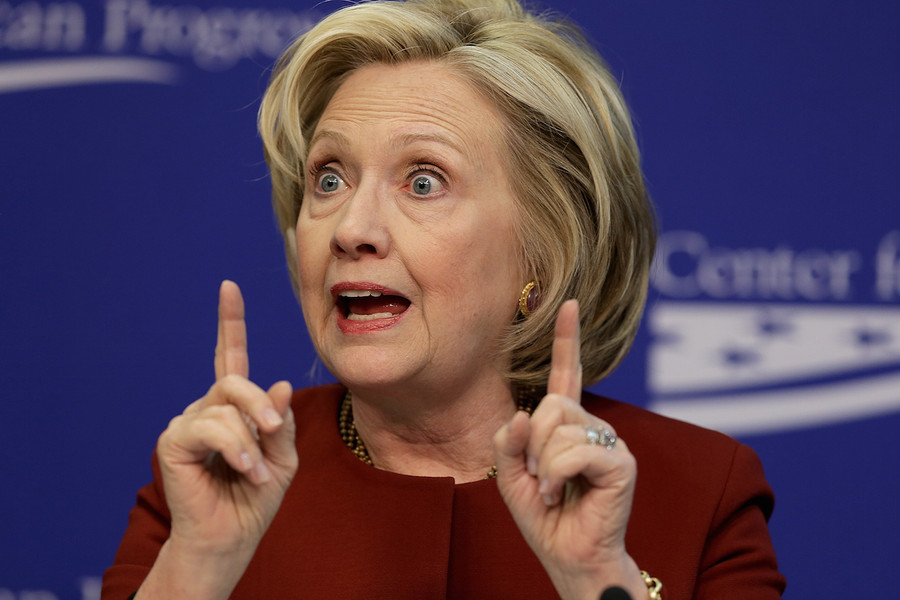By Stephen Dinan • The Washington Times
Hillary Clinton admitted under oath that she doesn’t recall asking anyone for permission to use a secret server and email account during her time in the State Department, contradicting previous public pronouncements that she had received approval.
Mrs. Clinton said she didn’t recall seeing a 2011 warning about increased hacking attempts on senior department officials’ private accounts and that she didn’t actually write another warning that was sent under her name.
“Secretary Clinton states that she does not recall being advised, cautioned, or warned during her tenure as Secretary of State about hacking or attempted hacking of her clintonemail.com e-mail account or the server that hosted her clintonemail.com account,” she said in sworn testimony dated Monday and filed in federal court Thursday.
A judge had ordered Mrs. Clinton to provide testimony as he decides whether the State Department fully complied with the Freedom of Information Act, which gives the public a right to see its public officials’ records — including emails that contain government business.
Mrs. Clinton for years foiled that law by using her secret account, which was tied to a server she kept at her home in New York, and which effectively shielded her emails from any sort of open records oversight. She returned some 30,000 messages in December 2014, nearly two years after she left government, and the FBI said it recovered thousands more that she failed to turn over.
Those are being released in batches, but Judicial Watch, a public interest law firm that has sued to get a look at all of the emails, is trying to get a full accounting of where the system broke down during Mrs. Clinton’s tenure.
Judicial Watch wanted to depose Mrs. Clinton in person, but Judge Emmet G. Sullivan rejected its request and said written responses would be enough.
Mrs. Clinton evaded answers to many of the 25 questions posed by Judicial Watch, saying they were outside the scope of the court case.
Tom Fitton, president of Judicial Watch, said that showed “disdain for the rule of law.”
The answers she did give were carefully crafted and usually revealed little about her decision-making concerning the emails.
She has repeatedly maintained that her use of a secret system was “allowed,” but the department’s inspector general, the FBI and now Mrs. Clinton herself said she never asked whether that was true. In fact, the practice broke policy, department officials have said.
In an interview this summer, Mrs. Clinton said it was “recommended” that she use a personal email account.
In her testimony this week, she said that recommendation didn’t come from anyone in government but rather from former Secretary of State Colin Powell. In a 2009 email message, Mr. Powell said he did use a private account but warned Mrs. Clinton to be “very careful.”
Blaming Mr. Powell also contradicts what Mrs. Clinton told the FBI. She told investigators that Mr. Powell’s advice did not factor into her decision.
Some of Mrs. Clinton’s staff who knew about her secret account voiced concerns to their superiors, but Mrs. Clinton said nobody raised the issue with her, nor did she discuss it with anyone else.
“Secretary Clinton states that she does not recall participating in any communications before or during her tenure as Secretary of State concerning or relating to her decision to use a clintonemail.com account to conduct official State Department business,” she said in the testimony.
She said that when she returned her messages to the government, she left it up to her attorneys to decide which ones were official business. She also said her attorneys were in charge of wiping her server clean, and she denied having “personal knowledge about the details of that process.”
Mrs. Clinton never told the official charged with storing her records about her secret arrangement and never thought to turn over her messages when she left the department in 2013.
She said she left it to her underlings to store her messages because she was often emailing them on their official state.gov accounts. But she admitted in her answers Thursday that she didn’t think about what would happen to messages she exchanged with those outside the department.
“She did not consider how e-mails she sent to or received from persons who did not haveState Department e-mail accounts would be searched by the Department in response to FOIA requests,” she said.
Last year, Mrs. Clinton testified to Congress that at least 90 percent of her messages went to other State Department employees so she was sure they were being stored. That number has since been challenged, including in an analysis conducted by The Washington Times.
In her sworn testimony Mrs. Clinton refused to say where she got the 90 percent number. She said the information was protected by attorney-client privilege.
Some of those messages to people outside the department have created problems forMrs. Clinton, including her exchanges with family confidant Sidney Blumenthal, who regularly offered his thoughts on how Mrs. Clinton should approach world hot spots.
Mr. Fitton said Mrs. Clinton’s answers Thursday provide “a little bit more information.”

